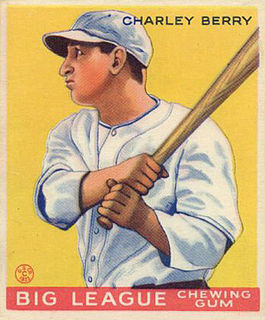| J. B. Hairstone | |
|---|---|
| Outfielder | |
| Born:April 6, 1891 Martinsville, Virginia | |
| Died: October 1978 (aged 87) Baltimore, Maryland | |
| Negro league baseball debut | |
| 1916 | |
| Last appearance | |
| 1922, for the Bacharach Giants | |
| Teams | |
|
James Burton "J. B." Hairstone, also known as "Harry" (April 6, 1891 – October 1978), was an American baseball outfielder in the Negro leagues. He was described as a "brainy" player and was one of the "original" Baltimore Black Sox players, playing for the team during a period (1916–1921) when they were transitioning from a semipro team to a major professional team that would later be one of the founding members of the Eastern Colored League. [1] In 1922, he finished his professional playing career with the Bacharach Giants. He was a manager late in his career, and also served as an umpire. [2] In 1925, he was seriously injured by a bayonet wound suffered while serving at a National Guard encampment. [3] [4]

Baseball is a bat-and-ball game played between two opposing teams who take turns batting and fielding. The game proceeds when a player on the fielding team, called the pitcher, throws a ball which a player on the batting team tries to hit with a bat. The objectives of the offensive team are to hit the ball into the field of play, and to run the bases—having its runners advance counter-clockwise around four bases to score what are called "runs". The objective of the defensive team is to prevent batters from becoming runners, and to prevent runners' advance around the bases. A run is scored when a runner legally advances around the bases in order and touches home plate. The team that scores the most runs by the end of the game is the winner.
An outfielder is a person playing in one of the three defensive positions in baseball or softball, farthest from the batter. These defenders are the left fielder, the center fielder, and the right fielder. An outfielder's duty is to try to catch long fly balls before they hit the ground or to quickly catch or retrieve and return to the infield any other balls entering the outfield. Outfielders normally play behind the six other members of the defense who play in or near the infield.
The Negro leagues were United States professional baseball leagues comprising teams predominantly made up of African Americans and, to a lesser extent, Latin Americans. The term may be used broadly to include professional black teams outside the leagues and it may be used narrowly for the seven relatively successful leagues beginning in 1920 that are sometimes termed "Negro Major Leagues".
In 1933, Hairstone led a group that established a new, independent team that claimed the name of "Baltimore Black Sox", obtaining an injunction forcing Joe Cambria's Negro National League team to temporarily rename itself as the "Sox". Hairstone's team played at Maryland Baseball Park, while Cambria's team played at Bugle Field. Both teams folded in 1934. [5]
Joseph Carl "Joe" Cambria, also known as "Papa Joe," was an American professional baseball scout and executive who was a pioneer in recruiting Latin American players. From 1929 through 1940, he owned several Minor League Baseball teams, as well as the Negro league Baltimore Black Sox. He is best known, however, for his work as a scout for Major League Baseball, especially for his work in Cuba. From the mid-1930s until his death in 1962, he recruited hundreds of Cuban players for the Washington Senators and Minnesota Twins. Cambria was described as "the first of many scouts who searched Latin America for inexpensive recruits for their respective ball clubs."
Bugle Field was a Baltimore based, predominantly wooden stadium utilized by the two primary Negro League teams of the 1916 to 1950 era, the Baltimore Black Sox, (1916-1933), and the Baltimore Elite Giants, (1938-1950). The Black Sox had a short tenure at the park, moving into the park permanently in 1932 before folding during the 1934 season. The Elite Giants were the park's primary tenants until its dismantlement during the 1949 Negro National League Championship Series. It was located on the northeast corner of Federal Street and Edison Highway, address 1601 Edison Highway. The site is in use today as the headquarters and local manufacturing plant of Rockland Industries, the first major corporation on record in Baltimore County, Maryland.









